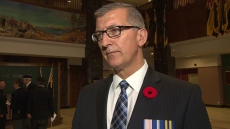OTTAWA — The climbing costs of bacon, smokes and natural gas helped propel the country's annual inflation rate to the unexpected mark of 2.4 per cent last month, its fastest clip in since early 2012, Statistics Canada said Friday.
The prices paid by Canadian consumers in October crept upwards, compared with a year earlier, in all of the agency's major categories. The bump was led by 2.8-per-cent hikes in each of the broader classifications of food and shelter.
The October increase follows a two per cent rise in September and put total inflation at 2.4 per cent for the first time since the early months of 2012.
"The basket of goods that you're buying every month is getting more expensive, but it's rising at a little bit of a faster pace than we've been used to in the past, at least the recent past," said Robert Kavcic, a senior economist with BMO Capital Markets.
Kavcic believes the numbers show how the weaker Canadian dollar, which has fallen over the past year, started to make an impact last month. He added, though, that the pace of inflation remains close to what is considered a normal level.
Looking at specific goods, Statistics Canada highlighted some of the biggest contributors to the year-over-year price increases: natural gas rose by 20.1 per cent, cigarettes by 11.5 per cent and meat by 12.4 per cent.
The meat subclass described as "fresh or frozen beef" surged by 19.4 per cent, while the "ham and bacon" bounced by 18.8 per cent compared to the year before.
"The nasty price jump in food is a major culprit for the soar in headline inflation, but price increases are prevalent elsewhere too," Arlene Kish, economist for the international forecasting house IHS Economic, wrote Friday in a research note.
The index identified categories that saw the biggest price decreases, including video equipment at 8.4 per cent, digital computing equipment and devices at 5.5 per cent and furniture at 2.9 per cent.
Geographically, prices rose in every province compared to the previous year, with Alberta posting the biggest increase at 3.0 per cent, followed by Ontario at 2.8 per cent. British Columbia saw the smallest gain in prices among the provinces at 1.1 per cent.
On a seasonally adjusted monthly basis, Canada's cost of living rose 0.1 per cent in October following an increase of 0.2 per cent the previous month. It crept upwards despite the month-to-month, four-per-cent drop in the price of gasoline from September.
Meanwhile, the annual core inflation rate, which excludes some volatile items from the food and energy categories, rose 2.3 per cent. It registered a pace of 2.1 per cent in September.
Both total-inflation and core rates for October came in higher than economists' expectations, which had anticipated the readings for each to hit 2.1 per cent, according to Thomson Reuters.
The year-over-year core inflation number was also higher than the Bank of Canada's prediction of 2.1 per cent for the fourth quarter.
That core figure is scrutinized by the Bank of Canada, which aims to keep it as close to its ideal two per cent target as possible.
"The bank was expecting both core and headline inflation to perk up in the fourth quarter, but the October number was a little stronger than they had bargained for," Leslie Preston of TD Economics wrote Friday in a research note.
With energy and commodity-related prices expected to dip lower in the coming months, Preston doesn't think it's time for the central bank to worry about the pressure of inflation just yet.
"But, October's inflation result does underscore the case for higher interest rates next year in Canada," Preston wrote.
In its October monetary policy report, the Bank of Canada indicated core inflation had climbed more quickly than expected since July, though it said it believed the number had remained close to its mandated, two per cent bulls-eye.
At the time, the central bank described the underlying inflationary pressures as "muted" due, in part, to the still-competitive retail sector.
The bank predicted both the core and headline consumer price index to stay near the two per cent zone for a sustained period, despite risks including stronger private demand from the U.S., continued disappointment in worldwide growth, beefed-up household spending in Canada and lower oil prices.
The central bank has maintained its trend-setting interest rate at one per cent for more than four years.
The Bank of Canada's next interest rate announcement is scheduled for Dec. 3.
Kavcic said while inflation is running a little hotter than usual, he doesn't expect the Bank of Canada to change its position any time soon.
"They just don't think that the recent pickup in inflation is going to stick and, because of that, I think it's going to take a few more strong reports before they start to seriously consider changing their economic policy tone," he said.






